
LFE-Revista de Lenguas para Fines Especificos
Scope & Guideline
Connecting Educators and Researchers in Language Studies
Introduction
Aims and Scopes
- Language for Specific Purposes (LSP) Education:
The journal primarily addresses the teaching and learning of languages within specific professional contexts, such as healthcare, business, and tourism, highlighting methodologies and curricular designs. - Contrastive Linguistics and Translation Studies:
A significant focus is placed on the comparison of languages, particularly in translation and the challenges faced in cross-linguistic contexts, offering insights into effective translation practices and pedagogies. - Intercultural Communication:
The journal explores the role of intercultural competence in language learning, emphasizing the need for learners to navigate cultural nuances in professional environments. - Pedagogical Innovations in Language Teaching:
It promotes innovative teaching practices, such as the use of technology in language instruction, active learning strategies, and the integration of audiovisual materials. - Research Methodology in Language Education:
The journal encourages rigorous methodological approaches in research pertaining to language education, including experimental studies, corpus analysis, and qualitative research.
Trending and Emerging
- Integration of Technology in Language Learning:
Papers focusing on the use of technology, such as online platforms and audiovisual resources, in language teaching and learning have become increasingly prominent, highlighting the need for modern educators to adapt to digital learning environments. - Needs Analysis in Language Programs:
There is a growing emphasis on conducting needs analyses to tailor language courses to specific professional requirements, particularly in fields like healthcare and business, ensuring that curricula meet the demands of learners. - Active Learning and Student Engagement:
Research indicating the effectiveness of active learning strategies, such as role-playing and project-based learning, is on the rise, reflecting a shift towards more interactive and participatory teaching methods. - Focus on Specific Professional Contexts:
An increased number of studies are dedicated to language learning within specific occupational fields, such as nursing and tourism, demonstrating a trend towards applied linguistics tailored to real-world professional scenarios. - Interdisciplinary Approaches:
Emerging themes indicate a trend towards interdisciplinary research that combines language education with other fields, such as sociology, business, and healthcare, fostering a more holistic understanding of language use in various contexts.
Declining or Waning
- General Linguistics:
There seems to be a gradual decline in papers focusing solely on general linguistic theories or discussions, as the journal increasingly emphasizes practical applications and specific contexts. - Traditional Grammar Instruction:
Research centered around traditional grammar instruction techniques is less prevalent, indicating a potential shift towards more communicative and context-based approaches to language teaching. - Literary Analysis:
While literary texts are still referenced, the journal appears to focus less on literary analysis in favor of applied linguistics and specific professional contexts. - Historical Linguistics:
Themes related to historical linguistics and the evolution of language seem to have decreased, suggesting a move away from diachronic studies towards contemporary language use in specific fields. - General Educational Theory:
There is a noticeable reduction in discussions surrounding broad educational theories, as the focus narrows to concrete methodologies and practices within language for specific purposes.
Similar Journals
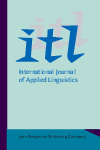
ITL-International Journal of Applied Linguistics
Fostering impactful research in linguistics and language acquisition.ITL-International Journal of Applied Linguistics, published by JOHN BENJAMINS PUBLISHING CO in Belgium, stands as a leading journal in the field of applied linguistics and education, recognized for its rigorous scholarship and impactful contributions. With an impressive ranking of Q1 in both the Education and Linguistics and Language categories, ITL holds its place among the top journals globally, featuring in the Scopus rankings with a notable 91st percentile in both Arts and Humanities as well as Social Sciences. The journal aims to disseminate innovative research exploring the intersection of linguistics, language acquisition, and pedagogical practices, fostering a rich academic dialogue among researchers, educators, and practitioners. Though not currently an open access journal, ITL remains accessible to a broad readership, with an emphasis on high-quality, peer-reviewed articles that inform and inspire advancements in applied linguistics. The journal's commitment to academic excellence and relevance makes it an essential resource for those seeking to understand and contribute to the dynamic landscape of language studies.
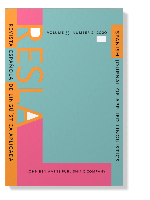
Revista Espanola de Linguistica Aplicada
Exploring innovative approaches in applied linguistics.Revista Espanola de Linguistica Aplicada is a prominent academic journal published by John Benjamins Publishing Co, specializing in the interdisciplinary fields of linguistics, education, and e-learning. With its ISSN 0213-2028 and E-ISSN 2254-6774, the journal has established a significant presence in Spain and beyond, showcasing innovative research and contributions in applied linguistics. The journal is recognized for its rigorous peer-review process and maintains impressive Scopus rankings, notably within the 72nd percentile for Arts and Humanities and 68th percentile for Social Sciences, reflecting its critical role in advancing the study of language and education. As of 2023, it holds a Q3 rank in Education and a Q2 rank in Linguistics and Language, underscoring its influence and relevance in these disciplines. Targeted at researchers, educators, and students alike, the journal aims to facilitate knowledge exchange and provide a platform for discussions that shape the future of linguistics.
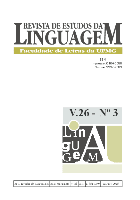
Revista de Estudos da Linguagem
Innovating Discourse in Language EducationRevista de Estudos da Linguagem, an esteemed academic journal published by the Universidade Federal de Minas Gerais within its Faculty of Letters, serves as a vital resource for scholars in the fields of linguistics and education. Since its inception in 1992, the journal has embraced an open access model, ensuring that research is accessible to a broader audience, thereby fostering collaboration and knowledge dissemination. Based in Brazil, this journal focuses on a wide array of topics related to language studies, contributing significantly to the discourse within the linguistics community. While recent rankings place it in Q4 in Education and Q3 in Linguistics and Language categories, its dedication to publishing high-quality research continues to attract attention despite its current Scopus rankings. The journal notably ranks at #668 in Language and Linguistics, verifying its emerging impact in the academic landscape. Researchers and students alike will find the journal's commitment to diversity in linguistic research a compelling reason to engage with its articles. The journal's offices are located at AV ANTONIO CARLOS, 6627 PAMPULHA, BELO HORIZONTE, MG, BRAZIL, and it continues to invite contributions that challenge established norms and explore innovative themes within the dynamic realm of language studies.

Cuadernos de Linguistica Hispanica
Unlocking Insights into the Hispanic Linguistic LandscapeCuadernos de Linguistica Hispanica is a distinguished open access journal published by UNIV PEDAGOGICA & TECNOLOGICA COLOMBIA, dedicated to advancing research in the field of linguistics and language studies since its inception. With an ISSN of 0121-053X and E-ISSN 2346-1829, this journal has established itself as an important platform for scholars to share innovative findings and insights within the linguistics community. As a Q3-ranked journal in linguistics and language according to 2023 category quartiles, it occupies a significant position in Scopus rankings, showcasing its commitment to quality and relevance. With the aim to foster scholarly discourse and promote understanding of the Hispanic linguistic landscape, the journal welcomes contributions that explore a diverse range of topics and methodologies. The journal has embraced open access since 2008, ensuring that research is accessible to a broader audience, thus enhancing its impact and engagement within both academic and professional spheres.
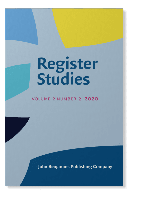
Register Studies
Empowering Scholars with Cutting-Edge ResearchRegister Studies is an innovative and vital journal dedicated to the exploration of linguistic registers and variability in language use across diverse contexts. Published by John Benjamins Publishing Co, this journal serves as an essential resource for researchers and professionals in the fields of linguistics, sociolinguistics, and communication studies. With its emphasis on empirical research and theoretical advancements, Register Studies aims to uncover the nuances of language in social interaction, providing a platform for high-quality scholarly work. Although specific accessibility options are not outlined, the journal adheres to rigorous academic standards and strives to contribute significantly to the understanding of language's role in society. By fostering an interdisciplinary dialogue, Register Studies equips students, researchers, and educators with the insights necessary to navigate and contribute to the ever-evolving landscape of language studies.

Iberica
Fostering innovation in language studies and research.Iberica, an esteemed journal published by AELFE, serves as a vital platform for scholarly discourse in the fields of linguistics and language studies. With its inception as an Open Access publication in 1999, Iberica has democratized access to high-quality research, fostering an environment of collaboration and innovation among researchers and professionals alike. Based in Spain at UNIV JAUME I, the journal has witnessed a remarkable ascent in the 2023 category quartiles, achieving a Q1 ranking in Linguistics and Language. Furthermore, its impressive Scopus rankings place it in the top 25% within both the Arts and Humanities and Social Sciences disciplines. Covering a diverse range of topics from theoretical linguistics to applied language studies, Iberica offers a compelling opportunity for academics seeking to contribute to and engage with contemporary issues in the linguistic landscape. As it converges in its publishing years from 2008 to 2024, it continues to set the standard for excellence within its field, making it an essential resource for students, researchers, and language professionals.

ESP Today-Journal of English for Specific Purposes at Tertiary Level
Elevating Pedagogical Strategies for Specific FieldsESP Today - Journal of English for Specific Purposes at Tertiary Level is a leading peer-reviewed journal published by the Faculty of Economics and Business in Serbia, focusing on the dynamic field of English for Specific Purposes (ESP) at the tertiary level. Since its inception in 2013, this Open Access journal has been committed to enhancing the understanding and application of ESP through innovative research and scholarly discussions. With an impressive Q1 ranking in Linguistics and Language for 2023, and robust Scopus rankings—#212 in the Language and Linguistics category and #247 in Social Sciences—ESP Today positions itself at the forefront of academic discourse in its domain, appealing to researchers, educators, and students alike. Its geographic reach and emphasis on educational advancements illustrate the journal's dedication to fostering global collaboration and dialogue within the community of language specialists. The journal not only provides a platform for cutting-edge research but also serves as a vital resource for those involved in language education, making significant contributions to the development of pedagogical strategies tailored for specific fields.

Colombian Applied Linguistics Journal
Empowering voices through open access research.Colombian Applied Linguistics Journal, published by UNIV DISTRITAL FRANCISCO JOSE DE CALDAS, serves as a vital platform for the advancement of knowledge in the field of applied linguistics, particularly within the Latin American context. Since its inception in 2003, the journal has embraced an Open Access model, ensuring that cutting-edge research is readily accessible to scholars, practitioners, and students alike. With a focus on topics including language acquisition, language policy, and bilingual education, the journal contributes to the understanding of linguistic diversity and its practical applications in educational settings. The Colombian Applied Linguistics Journal is dedicated to fostering dialogue and disseminating research that bridges theory and practice, thus playing a crucial role in shaping contemporary discourses in linguistics and education. Located in Bogotá, Colombia, the journal encourages submissions from both national and international authors, enhancing its reputation as a key player in the global linguistic community.

Journal of Research in Applied Linguistics
Bridging Theory and Practice in LinguisticsJournal of Research in Applied Linguistics is an esteemed academic journal published by Shahid Chamran University Ahvaz, Iran, focusing on the dynamic field of linguistics and language studies. With an ISSN of 2345-3303 and an E-ISSN of 2588-3887, the journal has established itself as a valuable resource for researchers and professionals aiming to explore diverse issues related to applied linguistics, including language acquisition, pedagogy, and sociolinguistic interactions. As part of a robust academic community since its inception in 2017, it is recognized with a Q2 quartile ranking in the world of linguistics and achieved impressive Scopus ranks reflective of its growing impact, particularly within the arts and humanities. The journal embraces an open access policy, enhancing its reach and availability to a broad audience. Researchers, educators, and students alike will find in the Journal of Research in Applied Linguistics a critical platform for dialogue, innovation, and contribution to the evolving landscape of language research.
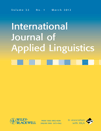
International Journal of Applied Linguistics
Leading the Discourse in Applied Linguistics ScholarshipInternational Journal of Applied Linguistics, published by WILEY, is a premier platform for cutting-edge research in the field of applied linguistics. With a notable Impact Factor and ranked in the top Q1 quartile of linguistics and language, this journal serves as an essential resource for scholars, practitioners, and students. The journal’s wide-ranging scope includes various subfields such as language acquisition, language education, sociolinguistics, and discourse analysis, fostering multidisciplinary approaches to language studies. It has achieved a significant Scopus Rank, placing it in the 90th percentile for both Arts and Humanities as well as Social Sciences categories, reflecting its high visibility and influence in the academic community. The International Journal of Applied Linguistics is committed to advancing the understanding of language use in real-world contexts through rigorously peer-reviewed articles that contribute to both theory and practical applications. While it is not an open-access journal, it remains a highly respected publication for researchers looking to disseminate and acquire knowledge in applied linguistics.